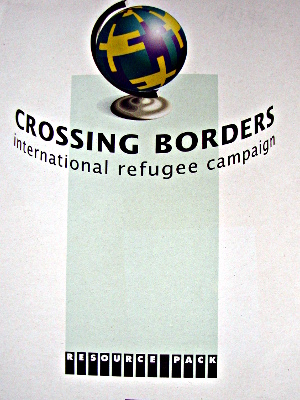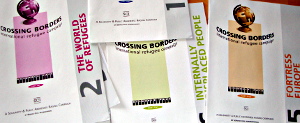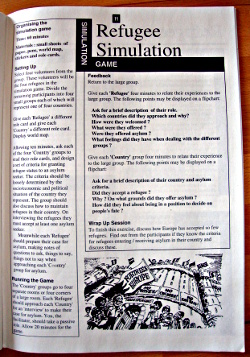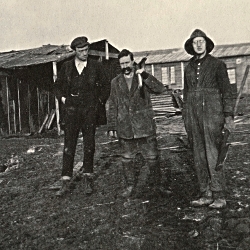Service Civil International
Crossing Borders – International Refugee Campaign Resource Pack (1996)
by Heinz Gabathuler (Jul 12, 2016)
 "If the number of displaced people in the world is swelling as they are forced to run from civil war, oppression or plain poverty, the response should not be to reinforce the walls of the rich-world fortress."
"If the number of displaced people in the world is swelling as they are forced to run from civil war, oppression or plain poverty, the response should not be to reinforce the walls of the rich-world fortress."
This sounds like a statement to the recent so-called "refugee crisis" in Europe. In fact, it is a quote from a 20-year-old document, edited by SEED – the Solidarity, Exchange & Education for Development, or simply the North-South Commission of SCI International.
Crossing Borders was the title of a campaign run by the SEED office in Antwerp for several years back in the 1990s – actually shortly before SEED as a separate SCI structure was officially abolished and integrated into the new International Secretariat set up in the same premises – and the newly created North-South Working Groups, such as Abya Yala, Africa WG, and later on Midi and Asia International WG.
 For me personally, the slogan "crossing borders" explains almost best what SCI is about: Transcending the petty boundaries that often separate human beings from each other: Boundaries of nationality, of religion, of gender or of age. Uniting human beings from this side of the border to others from the other side of the border: Catholics and Protestants in Northern Ireland. Pakistanis and Indians from the divided subcontinent. Young people from both sides of the iron curtain during the Cold War. And, in this case, Western European natives with those who had to flee their devastated, or just miserable, home countries for a secure and better life far away.
For me personally, the slogan "crossing borders" explains almost best what SCI is about: Transcending the petty boundaries that often separate human beings from each other: Boundaries of nationality, of religion, of gender or of age. Uniting human beings from this side of the border to others from the other side of the border: Catholics and Protestants in Northern Ireland. Pakistanis and Indians from the divided subcontinent. Young people from both sides of the iron curtain during the Cold War. And, in this case, Western European natives with those who had to flee their devastated, or just miserable, home countries for a secure and better life far away.
During the time of the campaign, and the production of this Resource Pack, people were fleeing the disaster of the war in former Yugoslavia. But refugees came also from various African countries to Europe. From Sri Lanka - a country where SCI had and still has a branch. The brochure was made for SCI workcamp participants mainly in Europe in order to make them aware of the situation of refugees in different parts of the world, and also to inform on SCI branches’ activities with refugees both in Asian and European countries – in India as well as in Slovenia.
 At the same time, the campaign tried to make volunteers aware of political tendencies to close the borders for those desperately trying to cross them: One of the six brochures in the Resource Pack is titled Fortress Europe – paradoxically (?) its production had been supported financially by the EU Commission’s General Directorate for Development.
At the same time, the campaign tried to make volunteers aware of political tendencies to close the borders for those desperately trying to cross them: One of the six brochures in the Resource Pack is titled Fortress Europe – paradoxically (?) its production had been supported financially by the EU Commission’s General Directorate for Development.
I still remember how SCI Switzerland introduced the Resource Pack and at its training weekends for camp coordinators. We were playing role games that should help us to put ourselves into the position of refugees. It was the time when my branch had started to put an emphasis on work with refugees: Workcamps in centers for asylum seekers were organized throughout the whole country, and on Saturdays, local volunteers went to such centers to play with children or to make excursions with adults.
The Resource Pack for sure served its purpose when it came to give background information to volunteers who were involved in such activities. On the other hand, being a camp leader in organic farms and permaculture projects, I simply refused to use the package for group evenings, as I was not able to make the link between its pedagogical impetus and the actual workcamp I was in. Well, probably I was wrong. In these days, for sure, it is worth to make the crossing borders theme an issue in all SCI workcamps. Therefore I was positively surprised when the SCI Switzerland office asked me to lend them a copy of the Resource Pack: Finally, a 20-years old document from the International Archives had some value not just for historians but for the daily affairs of SCI!
Heinz Gabathuler, International Archives Coordinator
Reference
11103.13 (first edition) and 11106.11 (second edition) in the one and only SCI
International Archives.



